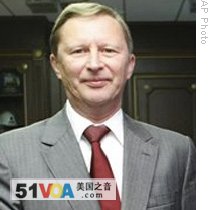Moscow
25 February 2009
 |
| Sergei Ivanov (file photo) |
Addressing lawmakers in the lower house of the Russian Parliament, Sergei Ivanov said Russia's military industrial complex has been considerably less affected by the global economic crisis than the country's civilian industries. The reason, he says, is simple - defense industries are funded by the state budget.
Ivanov notes there has also been no decrease in demand for Russian military exports, adding that the rising value of the U.S. dollar favors his country's defense industry.
The senior official says the government will focus on three aspects of military procurement in 2009; purchase of new equipment, research and development, and repair and modernization of existing equipment. Within these expenditures, he says priority will be given to Russia's strategic nuclear forces.
Ivanov says he is being frank so that everyone knows this includes the entire triad of strategic forces - missile defense, navy and air force. He recognizes this priority will be very expensive, but says Russians have no other way but to develop and perfect their strategic nuclear deterrent.
Ivanov also urged lawmakers to pass a measure to regulate the price of weapons and military hardware. And he said the best way to minimize inevitable negative effects of the global economic crisis on Russian industry is through government defense procurement.
Ivanov says as government defense appropriations reach firms, they will have no need to run to banks for credit. He notes that state orders are the most effective way to support Russian defense companies.
At the same time, Ivanov acknowledged the majority of Russian defense firms are having a tough time getting credit.
Speaking immediately after Ivanov, the director of the government's Russian Technologies Corporation, Sergei Chemezov, told lawmakers the organization has approached Western banks for loans to support Russian industry, because domestic credit is too expensive.
Chemezov says 36 percent of strategic firms in the military industrial complex are financially stable, and 30 percent are showing signs of bankruptcy. He says a particularly difficult situation has emerged in the areas of ammunition and special chemicals, where about half the firms face potential bankruptcy.
Meanwhile, the Interfax News Agency quotes Finance Minister Alexei Kudrin as saying Russia's 2009 federal budget revenues will drop by more than 30 percent compared to last year. This will create an eight percent budget deficit, Russia's first in several years.